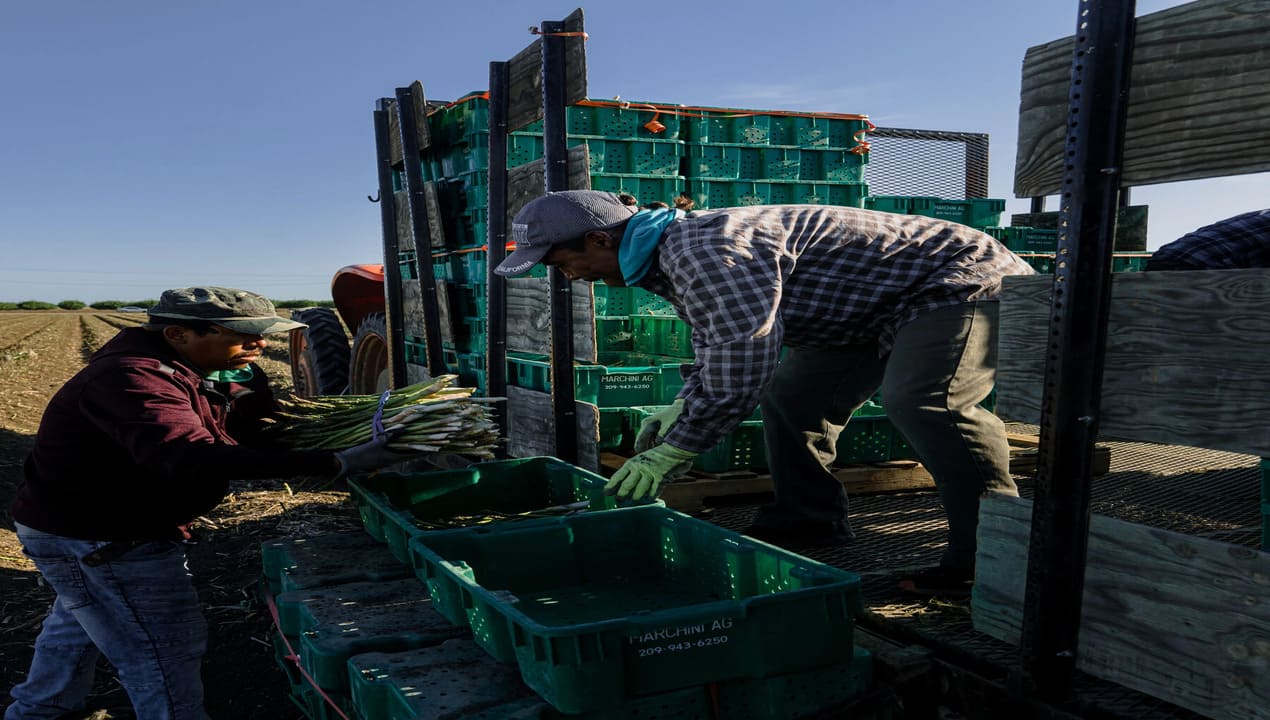
Independent Report – In Ventura County, California, Lisa Tate, a sixth-generation farmer, witnesses firsthand the impact of recent immigration raids on local agriculture. Ventura County is known for producing billions of dollars worth of fruits and vegetables each year. Much of this produce depends on immigrant labor, including many who are in the United States without legal authorization. Tate explains that the recent operations by U.S. Immigration and Customs Enforcement (ICE), part of the government’s crackdown on migration, have caused many workers to disappear from the fields.
Tate estimates that about 70 percent of workers have stopped coming to work since the immigration raids began. She warns that when such a large portion of the workforce is absent, much of the crop goes unharvested and can spoil quickly, sometimes in a single day. Tate points out that most Americans are unwilling to do this kind of work, and many farmers barely make a profit. She fears that this situation caused by the immigration raids may push many farms toward financial failure.
Across the agricultural lands stretching from Ventura County through California’s Central Valley, several farmers, field supervisors, and immigrant farmworkers have confirmed to Reuters that the ICE raids have led to a significant decline in labor attendance. This labor shortage means that crops are left unpicked and rot during the critical harvest season.
One Mexican farm supervisor, who wished to remain anonymous, shared that he usually manages around 300 workers on his fields preparing for strawberry planting. Recently, he had only about 80 workers available. Another supervisor reported a drop from 80 to just 17 workers on his field. These numbers demonstrate the dramatic reduction in the agricultural workforce due to the fear caused by the raids.
Economists and political leaders generally agree that many farmworkers in the United States are foreign-born, and a large number of them do not have legal status. Douglas Holtz-Eakin, a former Congressional Budget Office director and a Republican, estimates that roughly 80 percent of farmworkers are immigrants, with nearly half residing in the country illegally. He warns that losing these workers could cause serious disruptions in the food supply chain and increase prices for consumers.
Also Read : Tropical Storm Warning Issued for Mexico’s Gulf Coast
California is especially important to the nation’s agriculture. According to the California Department of Food and Agriculture, over one-third of the country’s vegetables and more than three-quarters of its fruits and nuts come from this state. In 2023, California farms and ranches generated close to $60 billion in agricultural sales. The absence of a reliable workforce threatens this vital industry.
Among the immigrant farmworkers Reuters interviewed, two were undocumented. They spoke on the condition of anonymity because of the fear of arrest and deportation. One, who has worked in U.S. agriculture for 30 years and has a family in the country, said many of his coworkers no longer come to work. He described the uncertainty and fear, saying workers do not know if they will ever see their families again if they show up for work.
The other undocumented worker spoke about waking up every day scared. Besides the dangers of working under the sun and heat, there is now a constant worry about being arrested and deported. He tries to avoid trouble on the streets, but understands that anyone arrested could face immediate deportation under current policies.
Despite these fears, some farmworker advocacy groups note that many workers still return to the fields because they have no alternative income. While attendance often dips after raids, the workers generally come back out of economic necessity. To reduce their exposure to ICE agents, some workers take precautions such as carpooling with people who have legal status or sending their children, who are U.S. citizens, to do errands like grocery shopping.
President Donald Trump acknowledged on his social media platform that ICE raids were removing long-time workers from both farms and hotels. He recognized that these jobs are difficult to fill and expressed concern about the harm to farmers. Although he promised to issue an order to address the situation, no policy changes have been implemented yet.
The White House reiterated that the administration supports farmers while also enforcing immigration laws. Anna Kelly, a White House spokeswoman, said President Trump remains committed to strengthening agriculture and boosting exports while upholding immigration enforcement.
An economist at Oxford Economics, Bernard Yaros, explained that native-born workers generally do not take the jobs left vacant by immigrant workers. Unauthorized immigrants tend to fill roles that native-born workers avoid, making their absence difficult to replace.
The raids have also unsettled even documented workers. Greg Tesch, who runs a farm in central California, said that the mention of ICE causes anxiety among all workers because many neighborhoods have a mix of people with and without legal documents. Tesch stressed the urgency of harvesting crops quickly, noting that peppers and other vegetables left unpicked for a few days become damaged and unusable.
The agricultural sector urgently needs labor to keep crops from spoiling. However, the current climate of fear around immigration enforcement is causing workers to stay away, leaving California’s farms at risk during a crucial time for food production.
Also Read : Chris Martin Keeps Good Ties with Dakota Johnson After Breakup